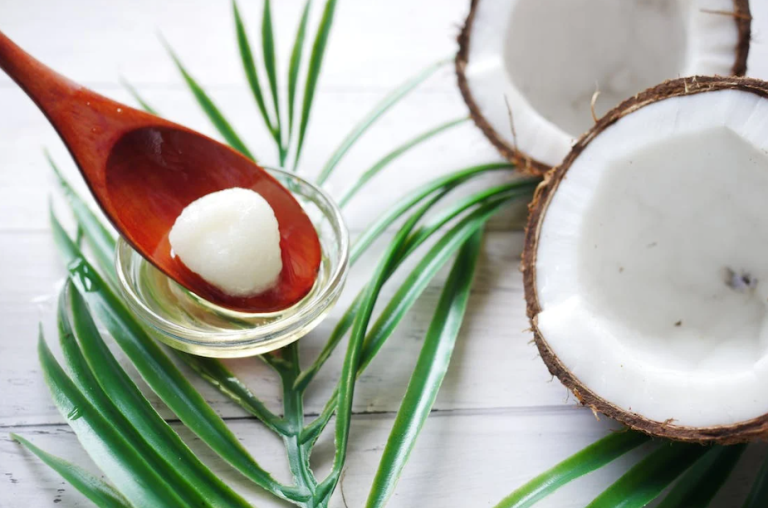
Every household can benefit from using coconut oil, whether it’s for cooking or personal care. While there are many advantages, there is also a lot of confusion surrounding the many varieties, labels, and brand packaging.
Below is a breakdown of the most frequently asked questions to make understanding coconut oils much simpler. You are undoubtedly already aware of the many uses of coconut oil, including hydrating the body and preparing delicious meals.
Yet, things can get complicated when deciding which coconut oil to use. You have a few options to pick from when phrases like refined, unrefined, and virgin are listed on the label. The distinctions between unrefined and refined coconut oil are discussed in this article, along with when each should be used.
What Is Coconut Oil?
Coconut meat is the source of coconut oil, a plant-based fat. Its claim to fame is that it is one of only plant-based oils that is solid at room temperature due to its high levels of saturated fat. Many people appreciate its bland, somewhat sweet flavor as well as the added crispiness it can give to cooked meals.
Coconut oil has recently gained a lot of popularity and is frequently promoted as a healthy substitute for animal fats like butter and lard. But, according to the most recent studies, coconut oil should be consumed in moderation just like any other saturated fat.
Coconut Oil Nutritional Information
The USDA provides the following nutritional data for 1 teaspoon (4.5 grams) of coconut oil.
- Calories: 40
- Fat: 4.5g
- Sodium: 0mg
- Fiber: 0g
- Protein: 0g
- Carbohydrates: 0g
- Sugars: 0g
Calories
Foods high in calories include coconut oil. 40 calories are in one teaspoon (which means, that 1 tablespoon comprises 120 calories). Most individuals should be careful about how much coconut oil they frequently consume because it is so high in calories.
Vitamins & Minerals
Micronutrients are present in the coconut fruit, however, they are not transferred to the oil. Coconut oil contains just trace levels of vitamins and minerals.
Carbohydrates
As coconut oil is a plant, you may anticipate that it contains some carbs. Yet coconut oil just has fat in it and no carbohydrates.
Fats
100% of coconut oil is fat. There are 4.5 grams total in 1 teaspoon, of which 80–90% are saturated fats. Lauric acid makes up the majority of the saturated fatty acids in coconut oil, which may contribute to some of its health advantages.
Refined vs Unrefined Coconut Oil
Between refined and unrefined coconut oil, there are two main differences: the processing technique and the type of coconut meat used. The extraction and processing techniques utilized have an impact on the smoke point and flavor of coconut oil.
Refined Coconut Oil
Dried coconut meat is utilized to make refined coconut oil. As the dried coconut meat is pressed through a machine to extract the oil, the result is odorless with heat or steam.
To get rid of any contaminants or germs, the oil is subsequently bleached and filtered through clays (although this procedure does not technically involve bleach, it is nonetheless referred to as such). The main distinction between unrefined and refined coconut oil is this extra pressing step.
Refined coconut oil differs from unrefined coconut oil in that it has a neutral flavor and aroma. Moreover, refined coconut oil has a higher smoke point, which is in the 400–450°F range.
Although it has a significantly shorter shelf life of only a few months, refined coconut oil can be stored similarly in a cold, dark environment. It is best to throw out coconut oil if it has mold, a yellow color, an unpleasant odor, or a flavor that is odd.
Unrefined Coconut Oil
Virgin coconut oil, which is often referred to as unrefined coconut oil, is oil that has been taken from coconut meat without further processing. Unrefined coconut oil can be extracted from coconuts using either a dry process or a wet process.
The dry process, also known as copra, presses coconut oil from the dried coconut flesh using a machine. Whereas the wet process entails pressing the coconut milk and oil separately from fresh coconuts.
The wet technique is mostly used to obtain unrefined coconut oil. The term “cold pressed” can be used to describe some unrefined coconut oils, meaning that no heat was used to remove them.
Unrefined coconut oil gives foods that contain it a rich coconut flavor and aroma. It is solid at room temperature. 350°F (177°C) is the oil’s smoke point or the temperature at which it starts to smoke.
When to Use Unrefined and Refined Coconut Oil
Hair & Skin Care
Because lauric acid in coconut oil provides moisture to nourish hair, it might also be beneficial for hair. Coconut oil can help mend split ends and stop them from happening in the first place. Making a hair mask with unrefined coconut oil is one way to incorporate it into your routine. If your hair has been over-styled and is damaged, the oil can aid.
Coconut oil is useful for skin care outside of the kitchen. Dermatologists advise using unrefined coconut oil, preferably one that has been cold-pressed rather than expeller-pressed. Expeller-pressed coconut oil is regarded to contain fewer nutrients than cold-pressed coconut oil, making the former better for skin care. Because lauric acid in coconut oil has such high antibacterial and antimicrobial properties, it can act as a moisturizer.
Baking
Due to its neutral flavor that won’t clash with other tastes in your baking recipe, refined coconut oil may be your best bet.
Use unrefined, though, if you want a stronger coconut flavor or are feeling a little frisky. Since unrefined has a lower smoking point, baking goods won’t be harmed by heating the oven to 350°F.
Also, either variety of coconut oil is a wonderful substitute for butter for vegans. Pie crusts benefit greatly from the solid fat.
Cooking
Refined coconut oil is preferable for frying since it can sustain greater temperatures due to its different smoke points. However, sautéing can be done with unrefined coconut oil. Unrefined coconut oil can be utilized in other savory recipes where you would want the flavor because it also has a strong coconut flavor.
Dietary Requirements
Because coconut oil fits dietary needs, some people utilize it. For instance, the oil is well-liked by followers of the low-carb, high-fat ketogenic diet because it has trace amounts of MCT oil, which may help burn fat. With their extremely comparable nutritional profiles, either variety is typically suitable for persons on the keto diet.
Nonetheless, some people can be more focused on the quality of their diet than the number of macronutrients. Unrefined coconut oil, for instance, would be a preferable choice because it has undergone less processing if you follow a diet that consists primarily of minimally processed foods.
Other Health Benefits of Coconut Oil
Boosts Vitality and Endurance
It is simple to digest coconut oil. Moreover, it boosts metabolism and creates more energy over a longer period of time.
According to studies, you can profit the most from coconut oil when you consume high-quality, unrefined varieties since its MCFAs are transported directly to the liver where they are turned into energy.
Nowadays, a lot of triathletes use coconut oil as fuel during long-distance training and competitions.
Coconut oil, raw honey, and chia seeds can be combined to create your own homemade energy source. Just combine one tablespoon of each, and eat it for 30 minutes before working out.
Reduces Ulcerative Colitis and Stomach Ulcers and Improves Digestion
Moreover, coconut enhances digestion by facilitating the body’s absorption of calcium, magnesium, and fat-soluble vitamins. As omega-3 fatty acids are easily digested and utilized by the body when taken with coconut oil, doing so can increase their effectiveness twofold.
By eliminating undesirable bacteria like candida, coconut oil may assist to enhance gut health and flora. Particularly when there is a candida imbalance, less stomach acid is produced, which leads to irritation and poor digestion.
Together, these factors show that coconut oil is good for the digestive system and can treat or prevent ulcerative colitis and stomach ulcers.
Support Bone Health
The two main contributing factors to osteoporosis are oxidative stress and free radicals. It is a well-known natural treatment for osteoporosis due to coconut oil’s strong antioxidant content, which aids in the battle against free radicals.
The intestinal absorption of calcium is increased by coconut oil. According to studies on osteoporosis, coconut oil not only strengthens and builds up the patients’ bones, but also prevents bone loss caused by the disease.
Aids in Alzheimer’s Disease Treatment
Ketones, which the brain may easily access for energy, are produced when the liver breaks down medium-chain fatty acids (MCFAs). Ketones give the brain energy without requiring insulin to convert glucose into cellular energy.
The brain actually produces its own insulin to metabolize glucose and power brain cells, according to research. Also, research suggests that the ketones from coconut oil may act as a substitute energy source for the brain of an Alzheimer’s patient when the brain loses the capacity to produce its own insulin.
Due to their neuroprotective, anti-inflammatory, and antioxidant qualities, medium chain triglycerides are highlighted in a 2020 review as having a role in the prevention of Alzheimer’s disease.
Is Refined Coconut Oil Healthy?
There is virtually an explosion of coconut oil and other by-products of the coconut available in grocery stores. Is coconut oil a good option? Coconut oil is a plant-based fat with a saturated content of over 90%, making it more saturated than butter or the fat found in meats as well as other plant-based fats like olive oil and canola oil.
High saturation lipids or fats are viewed as harmful options since they frequently increase blood levels of LDL or “bad” cholesterol, which raises the risk of heart disease. Coconut oil, like other plant-based lipids (fats), has a sweet, nutty flavor that some people find pleasant when used in cooking. It is also naturally free of cholesterol.
Some food producers moved to tropical oils like coconut oil and palm oil in the food product formulation as evidence grew several years ago that partially hydrogenated oils should be avoided due to the trans fats formed during hydrogenation. These tropical oils are solid at room temperature due to their high saturation level, just as the partially hydrogenated oils they were meant to replace.
For a 2,000 calorie diet, the American Heart Association advises aiming for a dietary pattern that keeps saturated fat to 5% to 6% of calories, or around 13 grams per day (from all forms). The use of coconut oil in moderation is advised by the Academy of Nutrition and Dietetics.
Conclusion
Although the nutritional profiles of refined and unrefined coconut oil are nearly identical, they differ greatly in other ways.
Unrefined coconut oil is less processed, has a stronger coconut flavor, and has a lower smoke point than refined coconut oil. Refined coconut oil also has a gentler aroma and flavor.
One sort of oil can be more appropriate for you than the other, depending on what you need it for. Nonetheless, both refined and unrefined coconut oils are excellent sources of healthful fat due to their identical nutritional contents.



Comments are closed.